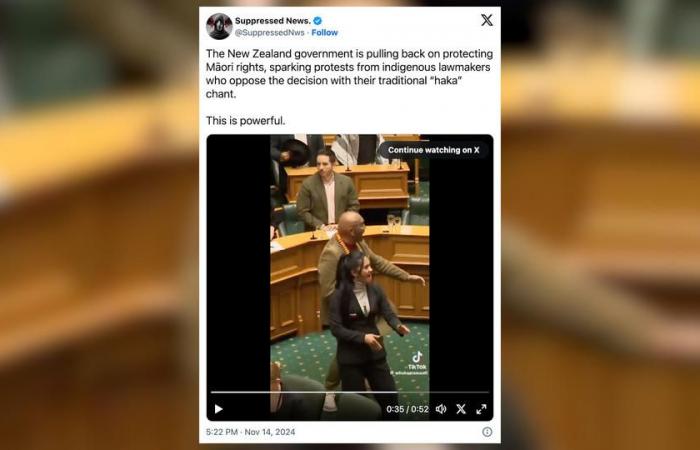Members of the Maori Party began a “haka”, a traditional dance, during a session of Parliament in New Zealand this Thursday, November 14, to protest against a bill providing for the revision of a treaty concluded between their people and the Crown New Zealand.
A strong image. In the middle of a vote to revise a historic treaty on the maintenance of Maori rights, at the initiative of the libertarian ACT party, deputies from the Maori Party present in the Hemicycle protested by performing a “haka”, a traditional Maori dance made famous by the All Blacks rugby team.
In support of this protest movement, other deputies present in Parliament joined the dance, as evidenced by certain images relayed on social networks.
The Treaty of Waitangi, signed in 1840 by more than 500 Maori chiefs and the New Zealand Crown, has until now governed relations between the government and the indigenous people, according to The Guardian.
“Different rights” granted to Maori under ACT
The libertarian ACT New Zealand Party, a minor partner in New Zealand's coalition government, proposed the bill to reform the Treaty of Waitangi.
After the first reading of this text and before its vote, the leader of the ACT New Zealand party, David Seymour, justified this bill before Parliament by indicating that this treaty granted “the Maoris rights different from those of others New Zealanders.
This initiative was greeted with whistles and groans from many elected officials opposed to this approach.
“Shame, shame, shame on you, David Symour. The principles of the treaty are clear. They refer to partnership, fairness, active protection and reparation. “This bill will undermine Maori rights, but David Seymour continues to propose this disgusting bill,” said Labor MP Willie Jackson.
The MP behind the “haka” would have been sanctioned
Maori MP Hana-Rawhiti Maipi-Clarke first tore up the bill submitted by ACT before launching a “haka” in the chamber.
According to information from the New Zealand daily, The New Zealand Herald, she was sanctioned by Speaker of the House Gerrie Brownlie, describing her behavior as “appalling”, “disrespectful” and “grossly disorderly”.
This bill also caused a stir among public opinion since thousands of people participated this week in a protest march, planned to last 9 days. Protesters began their journey from the tip of the North Island and are expected to arrive at Parliament on Tuesday.
More than 40 New Zealand lawyers also wrote an open letter to Prime Minister Christopher Luxon and Attorney General Judith Collins calling on them to scrap the bill.







